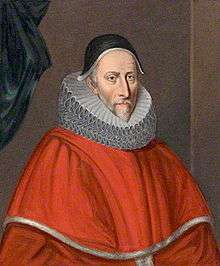4th Parliament of King James I
The 4th Parliament of King James I was the fourth and last Parliament of England of the reign of James I of England, summoned in 30 December 1623, sitting from 19 February 1624 to 29 May 1624, and thereafter kept out of session with repeated prorogations, it was dissolved on the death of the King on 27 March 1625.[1] The Speaker of the House of Commons was Sir Thomas Crewe, the member for Aylesbury.
History
The parliament was referred to as "Fælix Parliamentum" or the "Happy Parliament" by Sir Edward Coke.[2] The three previous parliaments of James I had been a source of conflict and the King's opening address to the Commons commented on the "desire of all parties to forget past disagreements." However the parliamentary session was clouded by mutual suspicion and nearly every speech made tacit or explicit comments with reference to previous sessions.[3] Charles, Prince of Wales and the Duke of Buckingham used the Parliament to aid their push for a war against Spain. Buckingham and Charles played a large role in ensuring the impeachment of Lord High Treasurer Lionel Cranfield, who was opposed to a war for financial reasons.[4]
The Fourth Parliament sat for only one session (labelled in statutes as "21 James I"), which ran from 19 February 1624 to 29 May 1624. Its second session was scheduled to start on 2 November 1624, but it was prorogued before opening to 16 February 1625 then again to 15 March and once more to 20 April. However, before that last date arrived, King James I died (27 March 1625), and the Fourth Parliament was dissolved.[5]
Notable Acts passed in the Parliament
- Statute of Monopolies 1623
- Common Informers Act 1623
- Intrusions Act 1623
- Forcible Entry Act 1623
- Limitation Act 1623
- Crown Lands Act 1623
See also
- List of MPs elected to the English parliament in 1624
- Acts of the 4th Parliament of King James I
- List of Parliaments of England
- Duration of English Parliaments before 1660
Notes
- Coke 1680, p. 2; Willis 1750, p. 187; Ruigh 1971, Preface
- Coke 1680, p. 2.
- Ruigh 1971, p. 2.
- Smith 1998, p. 63.
- Cobbett 1806, p. 1506.
References
- Cobbett, W. (1806), The Parliamentary History of England, I, p. 1506
- Coke, Sir Edward (1680), The third part of the Institutes of the laws of England : concerning high treason, and other pleas of the crown, and criminal causes, 3 (6th ed.), London: Thomas Basset, p. 2
- Ruigh, Robert E. (1971), The Parliament of 1624: Politics and Foreign Policy (illustrated ed.), Harvard University Press, p. 2, ISBN 978-0-674-65225-5
- Smith, David L. (1998), A History of the Modern British Isles 1603-1707: The Double Crown, Wiley-Blackwell, ISBN 0631194029
- Willis, Browne (1750). Notitia Parliamentaria, Part II: A Series or Lists of the Representatives in the several Parliaments held from the Reformation 1541, to the Restoration 1660 ... London. p. 187.CS1 maint: ref=harv (link)
Further reading
- Thrush, Andrew (2010), "The Parliament of 1624", in Thrush, Andrew; Ferris, John P. (eds.), The History of Parliament: the House of Commons 1604-1629, Cambridge University Press
- Baker, Philip (12 February 2018), 1624 Proceedings: The House of Commons, Blog at WordPress.com
.svg.png)
